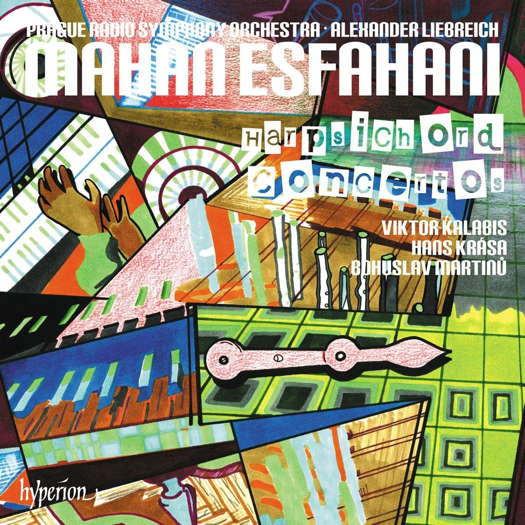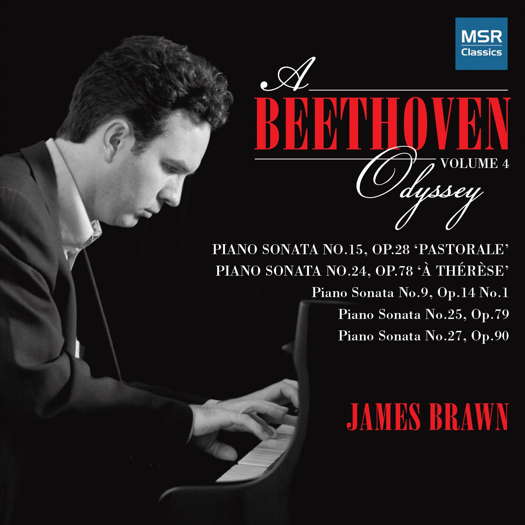- Origin Records
- Ars Produktion
- Austria
- John Russell
- Marion Stein
- Jonathan David Little
- El Sistema
- Merton College Oxford

Tremendously Attractive and Exciting
GERALD FENECH recommends this Hyperion recording of Czech harpsichord concertos
'All praise to Mahan Esfahani and his Prague Radio Symphony Orchestra team for compiling this hugely attractive programme, which is in fact a voyage of discovery of twentieth century Czech music.'
Harpsichordist Mahan Esfahani has made quite a name for himself with some outstanding Bach recordings together with other recordings featuring more neglected repertoire. This latest labour of love contains three works by twentieth century Czech composers: Bohuslav Martinů (1890-1959), Hans Krása (1899-1944) and Viktor Kalabis (1923-2006).
Composed in 1935, Martinů's Concerto for harpsichord and small orchestra reflects the composer's fascination with the baroque concerto grosso, and the work highlights the contrast between the harpsichord and the other instruments that seem to provide the driving force, with the piano taking a 'mediating role'. The Concerto is in three movements: a sprightly Allegro, a lovely and dreamy Adagio with a cadenza containing deliciously spicy crushed dissonances and a final Allegretto full of light and joy. Despite the modest forces, this is a work underlying symphonic forces, and Esfahani, conductor Alexander Liebreich and his Prague Radio Symphony Orchestra colleagues give us a performance that is surely the finest it has enjoyed on disc.
Listen — Martinů: Poco allegro (Concerto for harpsichord and small orchestra)
(CDA68397 track 1, 0:00-0:58) ℗ 2023 Hyperion Records Ltd :
Hans Krása, a German-speaking native of Prague who perished in the gas chambers of Auschwitz, is best known for his children's opera Brundibar which he composed in the ghetto of Theresienstadt in 1942. Following its rediscovery in 1980, other surviving Krása works came to light, among the last of which, in the mid 1990s, was the Kammermusik for harpsichord and seven instruments, composed a year after Martinů's concerto. Cast in two movements, it features a spiky first movement where the demeanour is often restless, with textures dominated by wind solos, while the harpsichord frequently provides a rhythmically driven, broken-chord underlay. The second movement is more relaxed, but there is an undertow of sadness, longing and nostalgia, alternating most effectively with livelier jazzy passages. The result is a uniquely haunting work which deserves much wider appreciation.
Listen — Hans Krása: Sehr ruhig (gehend)
(Kammermusik for harpsichord and seven instruments)
(CDA68397 track 5, 0:36-1:31) ℗ 2023 Hyperion Records Ltd :
Outwardly, Viktor Kalabis' three-movement concerto for harpsichord and strings (1975) might seem more conventional in terms of its forces and formal design, but that is to underestimate the powerful command of sonority and motivic development that is evident throughout this marvellous work. The contrasts between jagged, driven fast sections with a ghostly central episode reinforce the impression of a powerfully expressive musical language. It combines a mordant wit with an underlying refusal to compromise and a reflective close that is totally compelling.
Listen — Viktor Kalabis: Allegro vivo
(Concerto for harpsichord and string orchestra)
(CDA68397 track 8, 10:23-11:20) ℗ 2023 Hyperion Records Ltd :
All praise to Mahan Esfahani and his Prague Radio Symphony Orchestra team for compiling this hugely attractive programme, which is in fact a voyage of discovery of twentieth century Czech music. The Kalabis performance in particular should earn many new admirers for one of the most distinctive musical Czech voices of the later twentieth century. A tremendously attractive and exciting disc, superbly recorded and passionately performed, which I urge you to explore without hesitation.
Copyright © 12 April 2023
Gerald Fenech,
Gzira, Malta





